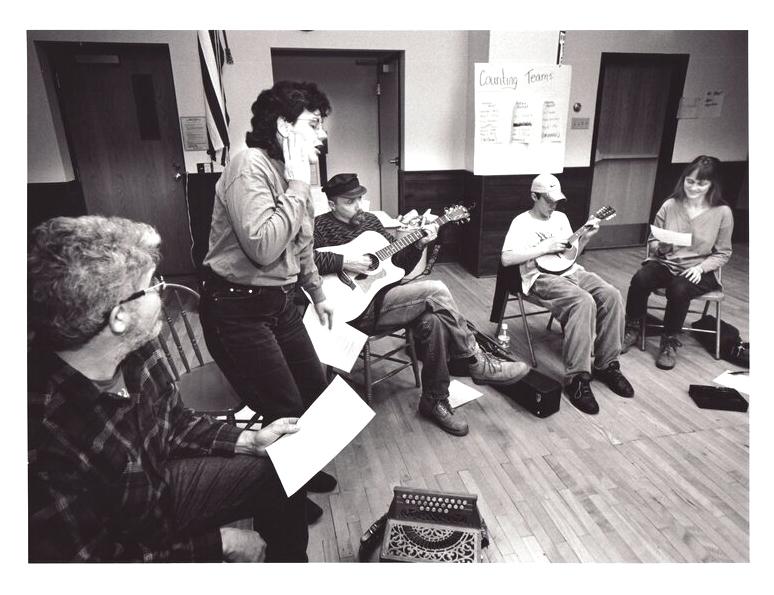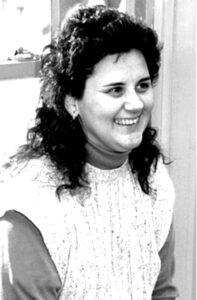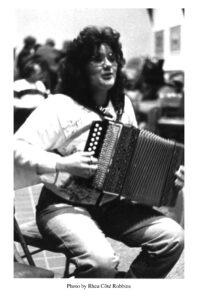Dates: 1961-98
Role in AFLCR: Member of the first board of directors, briefly
Martha Pellerin was born in Barre in 1961 to French-Canadian immigrants from the town of St. Sophie, in the Eastern Townships. They were a musical family, immersed in the Québécois tradition of performing music in house parties, called soirées, on cold winter evenings. Families and friends and neighbors would come together in someone’s living room or kitchen to socialize and make music together, playing fiddle, guitar, harmonica, hurdy-gurdy, or accordion, and stomping, and singing. The tradition originated in Brittany and was common in the Maritimes of Canada as well as in Québec.
Martha grew up within this musical tradition. On weekends her parents would crowd her and her six siblings into a car and drive north to the old homestead for a soirée. Martha learned to play the accordion and sang. “Growing up,” Martha would later recall, musical soirées were “a normal occurrence, lots of singing, the atmosphere was very warm and very loud. It was something I assumed every family did. Not until I was much older did I realize that not everybody had soirées. When my sisters and I were teenagers, we would go to an American party and be bored to tears. The American parties were so quiet!”
Sometime in the late 1980s, Martha’s father died. With his passing, she realized that the culture she’d grown up in and that she loved so dearly was slipping away as well. The rich musical culture was, astonishingly, not well known to the majority Anglophone Protestant New Englanders, who sometimes regarded French Canadians as second-class citizens, discriminated against them, and disrespected their culture. French-Canadian heritage was disappearing, as the immigrant generation was dying out—many immigrants’ children couldn’t even speak French. Assimilation was a powerful force. If French-Canadian cultural heritage was to have any chance of surviving, Martha realized, people like herself would have to take deliberate steps to preserve it.
From that point, Martha dedicated herself to promoting French-Canadian culture, especially in her native Vermont. She pondered “what the culture was all about and what it really meant to me.” She learned songs from that her friends and family sang and collected them, writing down lyrics in notebooks and tape-recording their renditions.
In 1990, to perform the songs, she formed a band with her friends Dana Whittle and Claude Méthé. It wasn’t always straightforward. Once when they were rehearsing in her mother’s kitchen, her mother “had the bright idea to invite some of her girlfriends over. So Dana and I were singing these songs in front of four or five women. We didn’t even get past the first verse and all of them are shaking their heads no. . . . And they would say, ‘That’s not how it goes.’ And one would start singing it the way she thought it went, she didn’t even get past the first line, and somebody else would yell at her, ‘No, no, no, you’ve got it all wrong!’ And they would sing another version.” They learned that “there are literally thousands of versions of every one of these songs because they were taught orally, they’re not written down.”
They named the band Jeter le Pont (Bridging the Gap), to signify its mission, and ultimately recorded enough to produced two albums.
But for Martha, a woman of passion and charisma, recording and performing were just the beginning. Throughout the 1990s, she championed French-Canadian traditional music with a quasi-religious fervor. She organized Franco-American music festivals at the Barre Opera House. She created or helped create the French Heritage Celebration in Barre, as well as La Danse des Enfants, and the St. Jean Baptiste Festival, bringing in performers from Québec. When the Franco-Voyageurs Project toured New England in 1995, “Martha was performer, production manager, stage manager and MC, she knew all the other presenters. She was like the mother of the whole outfit,” recalled one associate.
She reached out and invited everyone to the party. When she emceed a French Heritage celebration in Barre, someone recalled, at the end she pulled spectators up onto the stage to dance and sing—many of them were people she had known all her life. Soon much of the audience was dancing in the aisles.
She made a conscious effort to teach the culture to young Franco-Americans who had no awareness of their heritage. She brought the music into schools, working as an artist-in-residence to teach them through discussions and music. She worked closely with the Vermont Folklife Center to archive her collection of songs.Martha wasn’t alone; the Franco-American singer-guitarist Josée Vachon and others were also performing. But Martha, by the sheer force of her will, succeeded in stirring up broad interest in Franco-American culture. According to her friend Kim Chase, Martha was a “visionary leader,” who had “a sort of brute sincerity which stopped people in their tracks” and whose calling was “to do nothing short of breathing life into our languishing, battered culture.”

Martha attended early meetings of the Alliance Française of Vermont–Cercle Québécois, the precursor of the AFLCR, and was a board member at its first meeting of June 25, 1998. The minutes read: “Martha Pellerin made us aware of the prejudice against French Canadians in some areas. We agreed that there is a need to make the Americans of Franco Canadian background promote their heritage and make the younger generation proud and eager to speak French.”
In November 1998, at the peak of her powers and influence, tragedy struck. Martha Pellerin died of cancer at the age of 37. Her death came as a shock to the many fans of her electrifying and joyous music. “I don’t understand how she could be gone when she had so much more to do,” lamented Kim Chase, “when we needed her so much.” It fell to new fans of the music in Vermont to continue the process that she so dynamically began.
The following year, on the anniversary of her death in November, the Alliance would help organize “Martha Merci,” a Martha Pellerin memorial celebration, at St. Michael’s College, featuring performances of the French-Canadian music. Her legacy to the AFLCR remains the preservation and promotion of Québécois culture in northern Vermont.
Information and photos are from:
Kim Chase, “Martha Pellerin Drury, 1961-1998).”
Susan Creighton, “Remembering Martha,” Vermont Folklife Center,
Jim Lowe, “The Middlesex Bandstand,” Times Argus, July 2, 2015,
Pellerin, Martha. (1998). Martha Pellerin Collection of Franco-American Song, at the Vermont Folklife Center. A compilation of Franco-American songs and interviews collected by Martha Pellerin. The interviews are a mixture of French and English; the songs, which she learned orally from Franco-American families, are mostly in French.
Mary Wesley (host), “Remembering Martha,” with Ian Drury, Michele Choiniere, and Young Tradition Vermont, VTUntapped (podcast).
C. Seller, “Chansons for Martha Pellerin: Franco-American Musicians Honor a Powerhouse Cultural Leader,” Burlington Free Press, November 18, 1999.
—Janet Biehl

